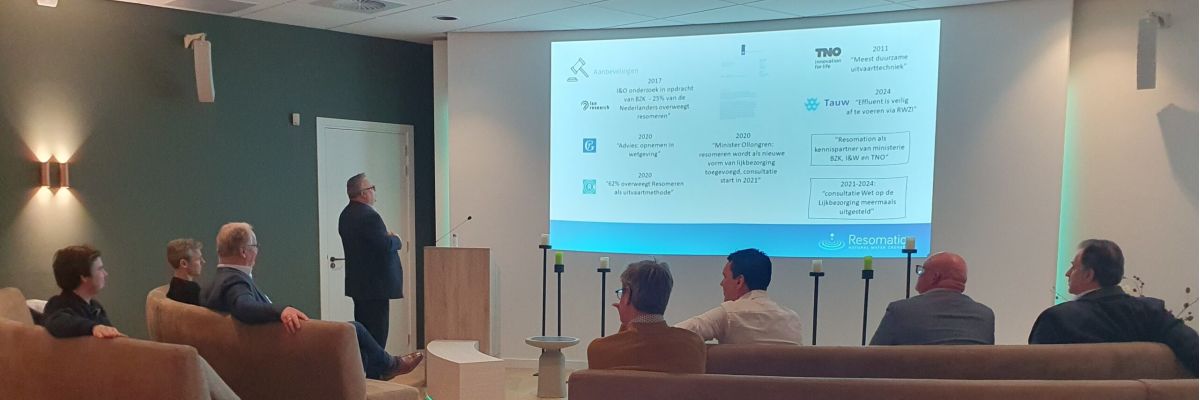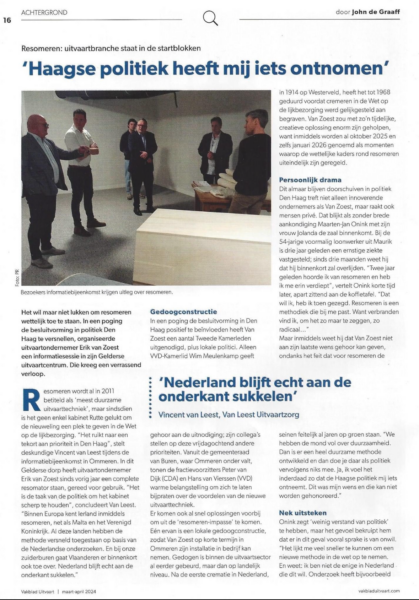
Lower House Resomation information visit to The Netherlands facility takes a suprising turn of events
Recently we advised of a MP visit to Erik van Zoest facility in Ommeren, The Netherlands for an information session with regards to Resomation being included in the Burial Act. We are now aware that during this visit, it became apparent that frustrations around continuous delay do not stop at industry members (that this sustainable method of disposition isn’t available) but also to members of the public.
In a surprising turn of events and without prior notice, a gentleman, Maarten-Jan Onink enters the room with his wife Jolanda where the MP visit is taking place. Maarten-Jan learnt 3 years ago he has a life-threatening illness and now has recently been told he only has 3 months to live. Maarten-Jan heard about Resomation 2 years ago and decided he wants to be Resomated when the time comes but currently cannot, as Resomation is not permitted in The Netherlands.
He says in front of the MP and congregation:
“”We talk about sustainability. When a very sustainable method is developed and politicians do nothing with it. Yes, I do feel that politicians in The Hague are taking something away from me. This was my wish and it cannot be honored.”
The MP present listened to Maarten-Jan Onink’s pledge and vowed to approach the Ministry of the Interior with this question. “Why it all has to take so long.”
1 week later the six questions were asked of the minister and we await the outcome.
Unfortunately, this situation with government procedural delays is all too common across the world.
Media article by Vakblad Uitvaart Maart/April 2024 and translation below:

Intro
There is no success in getting Resomation included in the Burial Act. In an attempt to speed up the decision-making process in political The Hague, funeral director Erik van Zoest organized an information session. This took a surprising course.
Headline
‘Politics in The Hague took something away from me’
Article
Resomation was dubbed the “most sustainable funeral technique” back in 2011, but since then no Rutte administration has managed to give the newcomer a place in the Burial Act. “It smells of a lack of priority in The Hague,” stated expert Vincent van Leest during the information meeting in Ommeren. In this village in Gelderland, funeral director Erik van Zoest has already had a complete resomator ready for use since 2023. “It is the task of politics to keep the government on its toes,” Van Leest concludes. “Within Europe, Ireland already has resomation, as does the United Kingdom. And Flanders will soon adopt it as well. The Netherlands continues to languish at the bottom.”
Tolerated construction
In an effort to positively influence decision-making in The Hague, Van Zoest invited a number of Lower House members, plus local politicians. Only VVD MP Wim Meulenkamp accepted the invitation; his colleagues have other priorities on this Friday morning. From the town council of Buren, which includes Ommeren, parliamentary party chairmen Peter van Dijk (CDA) and Hans van Vierssen (VVD) show warm interest in being updated on the advantages of the new funeral technology.
Solutions to get out of the “resoming impasse” also quickly come up. One of them is a local tolerance construction, so that Van Zoest can start operating his installation in Ommeren in the near future. Toleration has happened within the funeral industry before, but on a national level. After the first cremation in the Netherlands, in 1914 at Westerveld, it took until 1968 before cremation was made equal to burial in the Burial Act. Erik van Zoest would have been greatly helped by such a temporary, creative solution, because in the meantime October 2025 and even January 2026 are already mentioned as moments when the legal frameworks around Resomation will finally be settled.
Personal tragedy
This continual pushing forward in political The Hague not only affects innovative entrepreneurs like Van Zoest, but also affects people privately. This becomes apparent when, without prior notice, Maarten-Jan Onink enters the room with his wife Jolanda. The 54-year-old former contract worker from Maurik was diagnosed with a serious illness three years ago; for three months he has known that he will die soon. “Two years ago I heard about resoming and looked into it,” Onink says a short time later, sitting separately at the coffee table. “That’s what I want, I said then. Resomerization is a methodology that suits me. Because I find burning, so to speak, so radical…”
But by now he knows that Erik van Zoest cannot fulfill his last wish, despite the fact that for resomination the signals have actually been green for years. “We talk about sustainability. Then a very sustainable method is developed and then as politicians you do nothing with it. Yes, I do feel that politicians in The Hague are taking something away from me. This was my wish and it cannot be honored.”
Sticking your neck out
Onink says he has “little understanding of politics,” but the feeling creeps up on him that in this case there is mostly unwillingness. “It seems to me it could be done much faster to incorporate a new method into the law. And know: I am not the only one in the Netherlands who wants this. Research has shown, for example, that as many as 62 percent of people think resoming is a good idea. And politics does deal with such wishes in a very laconic way.”
With a certain resignation, Maarten-Jan Onink concludes that it will soon be ‘cremation’. “And I find that unfortunate. Not only for myself, let that be clear, but also for Erik. He is sticking his neck out with his company and is actually being thwarted in this. The Netherlands is seen by many as a guiding country; I would have liked to say that if it had been about resomination…”
Commitment
Onink’s account of course also touches Wim Meulenkamp, only active in the Lower House since the most recent elections. Nine years as alderman in the municipality of Hof van Twente (Overijssel) have taught him better than anyone else what measures do to people or what it does to people when measures fail to materialize. The concerned MP leaves Ommeren with a commitment. “I will soon receive a dossier on resoming from Mr. Van Leest and then I will approach the Ministry of the Interior. With what question? Why it all has to take so long.”
BOX
Following new research and customer wishes
With his funeral home/resomatorium ‘t Vijfde Seizoen in Ommeren, Erik van Zoest has anticipated the future, in which resomination will be permitted through a revision of the Burial Act. In fact, nothing now stands in the way of such a legal amendment; among others, TNO in 2016 and the Health Council in 2020 have already indicated they have no objections to the new funeral method.
While entrepreneur Van Zoest is actually ready in the starting blocks, three larger funeral organizations in our country are still holding back in the dressing room, so to speak. “The Ministry of the Interior is currently investigating the possibility of legally allowing this technique,” a DELA spokesperson said in a written statement. “One of the aspects of the associated consideration framework is ‘sustainability.’ Based on the information at the time, this new technique seemed feasible within that framework.”
In addition, DELA recently had existing and new funeral techniques studied (the Life Cycle Analysis). “This study is in its final stages and will provide a more complete picture of the effects of existing and new funeral techniques in terms of sustainability. We are awaiting both processes and do not anticipate whether or not new techniques will be allowed. DELA is investing in electric cremators based on green electricity. That is currently the most sustainably permitted alternative. In addition to the study we are commissioning, we are investigating our members’ wishes when it comes to new technologies and their potential supply.”
Monuta, in its written response, prefaces “innovations in the industry very much welcome. “We expect the demand for resoming to develop gradually and we will follow our customers’ demand in this. If they have a desire to be resomerized, we will of course help them make that happen. Developing new initiatives is not an issue for us at this time.”
“When the ball is finally in the court, we will offer resoming,” states Eveline de Koning, manager of marketing & sales at PC Uitvaart. The medium-sized Amsterdam-based organization operates in the northwest of the Netherlands and has its own funeral homes, crematoria and cemeteries. “In the capital, we own a building in the Watergraafsmeer district, which we have currently given on loan to the Dutch Funeral Museum Tot Zover. As soon as Resomation is legally permitted, we will convert that location into the most sustainable funeral home in Amsterdam and the surrounding area. Indeed, you could say that the drawings for this facility are already finished, so to speak. We are actually just waiting for a go from the government.” PC Funeral has not yet purchased a resomator. “But contacts with a manufacturer have already been made.”